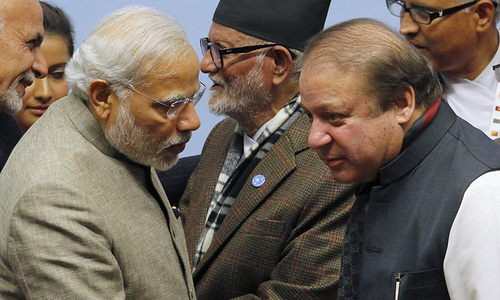A brief moment of expectation appears to be vanishing.
Earlier this week, water officials from India and Pakistan met under banner headlines for two-day talks about the three controversial hydropower projects India is building upstream on the Jhelum and Chenab rivers.
Pakistan is seeking international arbitration under World Bank auspices, whereas India is pushing for a lower level forum to seek a resolution arguing for the appointment of a neutral expert, as was done for the Baglihar Dam dispute. Following the talks, it appeared that India may have consented to go for arbitration by the World Bank, but latest pronouncements by the Indian side indicate that that may not be so.
If a way forward was not found in the talks held between the water officials this week, then it can only be said that those talks ended in failure.
Both countries have valid concerns in the matter, and only technical experts with a neutral disposition can arbitrate this matter. One mistake to avoid, however, is to view this dispute through the larger lens of the India Pakistan rivalry, or the Kashmir dispute. This is worth emphasising because matters unconnected with the Indus Waters Treaty have a way of inserting themselves into the water dialogue.
At a press conference after the recent round of talks, Khawaja Asif was asked whether there was a possibility that the discussions might lead towards a resumption of the composite dialogue, and he rightly swatted away the expectation. Talks held under the Indus Waters Treaty framework should remain focused on water issues.
Of course part of the reason why it is so difficult to achieve this focus in the present environment is because of Prime Minister Modi’s recent threat to walk out of the Indus Waters Treaty altogether.
Even though subsequent moves by the Indian government suggest the threat was more bluster than policy, it nevertheless did its damage, by dragging the treaty and water issues between the two countries under the clouds of suspicion that mar their larger relationship.
And from Pakistan’s side, its readiness to invoke the arbitration clauses of the treaty appears somewhat trigger happy, and that harms its case. Demanding a neutral expert in the Baglihar Dam dispute did not go down very well for Pakistan since the judgement came out in India’s favour. In the case of the Kishanganga and Ratle hydropower plants, arbitration could similarly go in either direction, based in large measure on how well Pakistan is able to build its case.
If the recent decision by the World Bank tribunal looking at the Reko Diq project is anything to go by, Pakistan is likely to feel challenged when the minutiae of its case are brought under intense scrutiny.
Both countries need to realise that their water issues stand above other disputes; and they must find a way forward accordingly.
Published in Dawn, March 24th, 2017














































